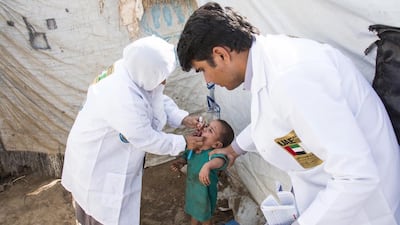As a small country, the UAE has to adopt conventional and unconventional methods to punch above its weight on the world stage. Our embassy in the United States, one of the UAE's most important strategic partners, is doing just that. As The National has reported, the United for a Better Future initiative, announced by Ambassador Yousef Al Otaiba in Washington this month, is designed to highlight the strength of the bilateral relationship and the closeness of links on very many levels. These range from mercantile matters – the UAE is the US's major trading partner in the Gulf – to military and security issues.
The closeness of these ties is hardly new. But the decision to tell Americans about it is a departure from the traditional modes of diplomacy. The UAE has often exercised soft power in the US. A good example is the financial help given to American communities struggling to rebuild after natural disasters such as Hurricane Sandy. And then there was the decision to send dozens of young Emirati volunteers to help rehabilitate storm-hit neighbourhoods.
The real value of Ambassador Al Otaiba’a outreach is that many more Americans will get to know about the UAE and its work in the US and elsewhere. The Washington embassy’s public diplomacy campaign covers both traditional and new media – YouTube, Facebook, Twitter – reaching baby boomers and millennials alike. Such a gentle reminder of the UAE’s soft power would surely come in handy elsewhere too. Our country has a proud history of helping those in need, wherever they may be, so similar outreach would probably be useful for our global network of embassies. The UAE built cyclone shelters in Australia. Do enough Australians know this? In Pakistan’s poorest provinces, the UAE has run polio campaigns. But are enough Pakistanis aware of this? And do the Indians – polio-free and desperately worried about being infected from across the border – know this too?
Sometimes, it is not enough to do good. It is important to be known to have done so. In the right hands, public diplomacy can be a remarkable tool. It can polish a country’s image, build goodwill and promote an informed understanding of its policy and preoccupations. Prudent transparency could also extend to more frequent foreign policy discussions with the press – at home and abroad.

